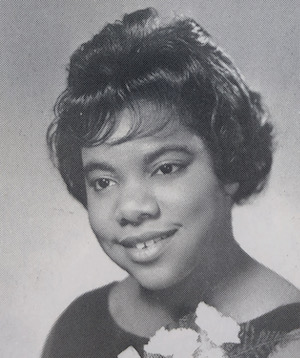Louise
LaVelle McKinnie 1944-2016
American
jazz and gospel singer Louise Lavelle McKinnie Duggan was
born May 22, 1944, in Kankakee, near Chicago, in a
musicians’ family. She died February 4, 2016, in
Switzerland
Her father played the guitar in Nat King Cole’s band, and
her mother was a dancer and singer in the Cotton Club. After
a career of lyric singer, she progressively went back to
jazz and gospel. She appeared in the musical
Hello Dolly in Broadway. She then toured across America,
singing rhythm and blues with the greatest names in soul
music such as Ray Charles or Sammy Davis Jr. She also
contributed to great jazz bands of Lionel Hampton, Buddy
Rich, Maynard Ferguson and Quincy Jones.
Here is a translation with minor editing from the French of
her Wikapedia entry:
La Velle was born in Kankakee, Illinois, near Chicago, into
a family of musicians. His father was then a guitarist in
the Nat King Cole orchestra and his mother a dancer and
singer at the Cotton Club.
aShe started learning music very early on. At three years
old, she was already singing in gospel choirs, and at five,
she began studying piano. She was the youngest student
at the National Conservatory of Chicago - at the age of
eleven - she was quickly noticed for her exceptional
qualities and received a scholarship from the Ford
Foundation. Very quickly she won the Chicagoland Music
Festival/ and Audition of the Air prizesof the Illinois
Opera House . At fourteen, she sang in the
Messiah of Handel.
Passionate about classical music, La Velle continued her
studies and obtained, before she was eighteen, several
diplomas at the renowned Julliard School of Music in New
York.
Exploring the lyrical repertoire, she obtained a role of as
a soprano in Madame Butterfly, then performed in Carmen and
La Tosca at the Metropolitan Opera in New York, before
performing at La Scala Milan on a tour with the Met.
Her exceptional voice - she covered 4 octaves - opened the
doors to a career as a lyrical artist. But gospel - which
rocked her childhood and jazz - which she worked on
alongside her classical music studies, slowly gained the
upper hand. On Broadway, she appeared in the musical Hello,
Dolly!
LaVelle then decided to make herself known as a rhythm and
blues singer . She began working in clubs with local
artists, traveling the country from to Los Angeles and New
York. During this period, she sang soul music alongside Ray
Charles, participated in major shows of Sammy Davis Jr,
and Steve Allen. She was also part of the great jazz
orchestras of Lionel Hampton, Buddy Rich, Maynard Ferguson
and Quincy Jones and sang alongside Joe Williams and Lou
Rawls.
In 1977, La Velle moved to France. That same year, she
released her first album, “Winter’s Mind.” During the
following years, she released solo albums, perform leading
roles in musicals, notably in the rock opera
Nostradamus alongside Richard Cross in1985; she was a
chorister for big names in jazz 1989, she accompanied
Dee Dee Bridgewater. She continued to sing jazz and rhythm
and blues, participated in various projects (Psalms, in
particular - an ephemeral quartet formed in1987 in Paris -
in which she sang with Liz McComb, both accompanied by
Jerome Van Jones and Gregg Hunter. It was during this time
that she also made commercial music and sang in commercials.
Then, in 1990, she recorded the album “Straight Singin’”-
Tribute to Nat King Cole, which she produced herself with
the help of a few friends.
While continuing the tours and concerts, La Velle began to
lead singing masterclasses where she shared her passion for
Gospel and Negro spiritual songs . On this occasion, she
stimulated the formation of many gospel groups and choirs in
France, in particular Vocal Colors, a gospel group with
which she remained close.
From 1995 to 1998, she participated in the French dance
music collective B-One and appeared on five of their
singles: /Can’t Stop The Boogie/ , /It’s A Shame/ , /The
Future/ , /Play The Game/ and /Voyage Voyage .
La Velle then left France for Switzerland, where she settled
in Saint-Cergue. She directed a gospel choir in Lausanne,
and continued to lead masterclasses and give concerts.
In 1992, La Velle received from the hands of the French
Minister of Culture the title of Chevalier des Arts et
des Lettres .
|

|


